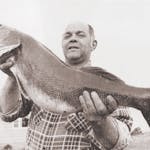Growing up in small-town Indiana in the 1960s and '70s, Steve Merchant wanted to be Curt Gowdy — the legendary host of ABC Television's "The American Sportsman."
Gowdy was born in Wyoming with a fly rod in his hand. Yes, he was a famous sports broadcaster. But to Merchant, Gowdy was the worldly hunter and angler who was a gentleman in the field and who preached respect for the land.
Merchant, retiring in three weeks from the wildlife division at the Minnesota Department of Natural Resources (DNR), doesn't hunt and fish with celebrities like Gowdy did. But for part of his career he lived the same dream of unlimited exposure to the wild, never letting dust settle in his double-barreled shotgun.
As his career draws to an end, he is concerned that fewer modern hunters and anglers see themselves as stewards of the natural world.
"I worry that some people who are engaged in hunting and fishing … consumptive outdoor wildlife activities … are listening to a narrative that the environmental mind-set is not needed," Merchant said in an interview last week.
He sees economic interest groups purposely trying to divide game and fish types from other outdoors stakeholders. The issues include proposed sulfide-ore copper mining near the Boundary Waters Canoe Area, take-backs of public land, and protecting the use of toxic lead shot over nontoxic ammunition.
"Ensuring that wild things have a place in the modern world is an uphill battle," Merchant said.
One of his proudest DNR accomplishments was helping Minnesota establish sustainable forestry practices on nearly 10 million acres of state land. Once dominated by timber values, DNR forest decisions now consider other interests on a more consistent basis. The checklist includes habitat for deer, moose, elk, bear, wolves and non-game wildlife.
Long entrenched as a senior office holder on the second floor of DNR headquarters in St. Paul, Merchant was Minnesota's deer czar at one time and has continued to be a voice in deer management. Not too long ago as a wildlife division supervisor, 13 different managers of various species reported to him.
Formative years
At the age of 60, Merchant is retiring with full benefits under the old "Rule of 90" that combines age with years of service.
His DNR story began in Bemidji, where he helped wildlife officials capture and band ducks. It was seasonal work, two years in a row, but it gave him a foot in the door when he was fresh out of college.
Merchant had spent his youth in Elkhart, Ind., fishing a lot and playing with turtles and frogs. His mom was a homemaker and his father worked in insurance. Hunting was something his Swedish uncles did on Thanksgiving Day when they gathered their gun dogs and pushed area fields for pheasants. He secretly wanted to go.
Instead, he whet his outdoors appetite by reading countless issues of National Geographic, vacationing in the Adirondacks and traveling with family to park lands away from home.
So serious was his interest in amphibians and reptiles that he considered getting a college degree in herpetology. Instead, he studied forestry and wildlife at Michigan Tech in Houghton. That's where he taught himself to hunt.
Today, Merchant is foremost a fly fisherman and a hunter of grouse, woodcock and quail. He's raised five English setters and a curly-coated retriever named Jammer — his first hunting dog.
"You could walk out your door into grouse woods," Merchant said of his undergraduate years.
Before he transitioned to Minnesota, Merchant earned a master's degree in wildlife science from New Mexico State. Oddly, several of his classmates also were destined for wildlife jobs in Minnesota.
In the woods
Merchant's first full-time DNR appointment was as a wildlife technician at Carlos Avery Wildlife Management Area. But his most memorable early job was as an assistant manager at Red Lake Wildlife Management Area in a remote forest south of Baudette and Roseau. The state-owned cabin he lived in and worked from was 20 miles away from the nearest paved road.
"All I did was work and hunt," Merchant said. "That's pretty good stuff when you are young."
There he did habitat work in a failed attempt to save a group of local forest moose from "blanking out."
Later, when promoted to a supervisory role in Madison, Minn., Merchant spearheaded an effort to translocate prairie chickens to Lac qui Parle County from an area east of Moorhead. That, too, failed.
His arrival at DNR headquarters in St. Paul in the 1990s was a concession to getting married, he said.
His hope in retirement is that more hunters and anglers stand up for the environment. Wild places and wild things are tough to defend against desires for economic growth, he said.




